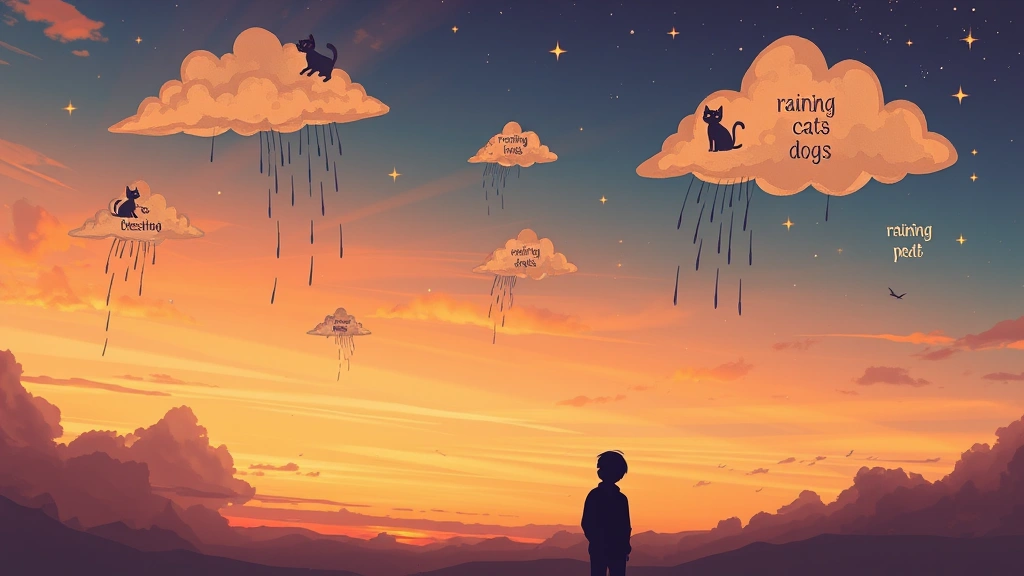Have you ever looked up at the vast expanse of the sky and felt a sense of wonder? The sky, with its ever-changing moods and endless horizons, has inspired poets, dreamers, and everyday conversations for centuries. It's no surprise that this celestial canvas has found its way into our language, giving birth to a fascinating collection of idioms!
Idioms are those quirky phrases where the meaning isn't obvious from the individual words. They add color, depth, and a touch of mystery to our conversations. And when it comes to the sky, these expressions truly shine! Imagine trying to explain "pie in the sky" without understanding the idiom – it would be quite a puzzle, wouldn't it?
In this exciting journey, we're going to explore 35 captivating idioms related to the sky. You'll discover how these phrases are used in everyday English, enriching your vocabulary and helping you understand native speakers better. So, are you ready to reach for the stars and dive into the wonderful world of sky idioms? Let's begin!
35 Idioms for Sky
Here’s a fantastic list of idioms that draw inspiration from the sky, along with their meanings and how you can use them.
-
Blue-sky thinking: Creative ideas that are not limited by current reality or practicalities.
- Example: "For our new project, we need some serious blue-sky thinking to come up with innovative solutions."
-
Pie in the sky: An unrealistic hope or promise; something that is impossible or very unlikely to happen.
- Example: "His promises of instant riches were just pie in the sky."
-
To reach for the sky: To aim for something very ambitious or difficult.
- Example: "Don't be afraid to reach for the sky with your dreams!"
-
Under the sky: Outdoors, in the open air.
- Example: "We enjoyed a picnic under the sky, feeling the gentle breeze."
-
A bolt from the blue: Something completely unexpected and surprising.
- Example: "Her resignation came as a bolt from the blue; nobody saw it coming."
-
Every cloud has a silver lining: Every difficult or unpleasant situation has some positive aspect.
- Example: "Losing my job was tough, but every cloud has a silver lining; I found a much better one!"
-
To be on cloud nine: To be extremely happy.
- Example: "After getting the promotion, she was on cloud nine for days."
-
To have your head in the clouds: To be impractical or dreamy; not paying attention to what is happening around you.
- Example: "He often has his head in the clouds, dreaming of far-off adventures."

-
To praise to the skies: To praise someone or something very highly.
- Example: "The critics praised her performance to the skies."
-
The sky's the limit: There is no limit or restriction; anything is possible.
- Example: "With your talent and dedication, the sky's the limit!"
-
To clear the air: To resolve a dispute or disagreement, often by discussing it openly.
- Example: "We need to have a serious talk to clear the air between us."
-
To promise the moon/stars: To make extravagant or impossible promises.
- Example: "He promised her the moon and stars, but delivered nothing."
-
To come hell or high water: No matter what difficulties arise.
- Example: "I'll finish this project by Friday, come hell or high water."
-
To feel under the weather: To feel slightly unwell or sick.
- Example: "I'm feeling a bit under the weather today, so I might go home early."
-
To chase rainbows: To pursue something that is impossible or unrealistic.
- Example: "She spent years chasing rainbows, hoping to find a perfect life."
-
To be a ray of sunshine (in someone's life): Someone who brings happiness and positivity.
- Example: "Her cheerful attitude is a ray of sunshine in our often-gloomy office."
-
To be full of hot air: To talk a lot, but without saying anything meaningful or true.
- Example: "Don't listen to him; he's full of hot air."
-
To save for a rainy day: To save money or resources for future needs or emergencies.
- Example: "It's always wise to save for a rainy day."

-
To have one's head in the clouds: To be impractical or dreamy; not paying attention to what is happening around you. (Repeated for emphasis and commonality)
- Example: "He's got his head in the clouds if he thinks that plan will work."
-
To get wind of something: To hear a rumor or private information.
- Example: "The police got wind of the plan to rob the bank."
-
To be a fair-weather friend: Someone who is only a friend when things are easy or convenient.
- Example: "He abandoned me when I lost my job; he's just a fair-weather friend."
-
To weather the storm: To survive a difficult or challenging period.
- Example: "The company managed to weather the storm during the economic downturn."
-
To throw caution to the wind: To act recklessly or without worrying about the consequences.
- Example: "She threw caution to the wind and quit her stable job to travel the world."
-
To be up in the air: Undecided or uncertain.
- Example: "Our travel plans are still up in the air due to the changing flight schedules."
-
To build castles in the air: To make unrealistic plans or dreams.
- Example: "Instead of building castles in the air, let's focus on practical steps."
-
To be a breath of fresh air: Someone or something that is new, refreshing, and welcome.
- Example: "Her innovative ideas were a breath of fresh air for the team."
-
To be walking on air: To feel extremely happy or ecstatic.
- Example: "Ever since he proposed, she's been walking on air."
-
To be over the moon: To be extremely pleased or happy.
- Example: "They were over the moon when they heard the good news."

-
To have a stormy relationship: A relationship characterized by frequent arguments and disagreements.
- Example: "They've had a stormy relationship for years, constantly breaking up and getting back together."
-
To rain on someone's parade: To spoil someone's plans or enthusiasm.
- Example: "I don't want to rain on your parade, but that idea might be too expensive."
-
To be a sign of the times: Something that indicates the nature of the present period.
- Example: "More people working from home is a sign of the times."
-
To reach for the stars: To aim for something very ambitious or difficult. (Again, for commonality)
- Example: "Never stop reaching for the stars, because you never know what you can achieve."
-
To fall out of the sky: To appear suddenly and unexpectedly.
- Example: "A solution to our problem seemed to fall out of the sky."
-
To be in seventh heaven: To be in a state of extreme happiness.
- Example: "After winning the lottery, he was in seventh heaven."
-
To paint the sky: To create a beautiful or dramatic sky, often used metaphorically for artistic expression.
- Example: "The sunset painted the sky with vibrant hues of orange and purple."
FAQs about Sky Idioms
Understanding idioms can sometimes feel like a puzzle, but with a little practice, you'll master them! Here are some common questions you might have.
Q1: Why are there so many idioms related to the sky and weather?
A1: The sky and weather are universal experiences that affect everyone, everywhere. They provide a rich source of metaphors because they are constantly changing, powerful, and often unpredictable, mirroring human emotions and situations.
Q2: Are these idioms used in formal or informal settings?
A2: Most of the idioms related to the sky are used in informal settings, like everyday conversations with friends and family. However, some, like "blue-sky thinking" or "weather the storm," can be used in business or more formal discussions to add color and emphasize a point.
Q3: How can I remember all these idioms?
A3: The best way to remember idioms is to use them! Try incorporating one or two new idioms into your conversations each week. You can also create flashcards, write example sentences, or even draw little pictures to help you connect the idiom with its meaning. Reading and listening to native English speakers will also expose you to these phrases naturally.
Q4: Do these idioms have the same meaning in all English-speaking countries?
A4: Generally, yes! Most of these common sky idioms have consistent meanings across different English-speaking countries like the US, UK, Canada, and Australia. While there might be very minor regional variations in usage, the core meaning remains the same, making them great for global communication.
Q5: Can I make up my own idioms?
A5: While you can certainly be creative with language, idioms become established over time through common usage. It's best to learn and use existing idioms first. Trying to invent new ones might lead to confusion, as their meaning won't be understood by others.
Key Takeaways
Wow, what a journey through the language of the sky! You've just explored 35 fantastic idioms that will undoubtedly add sparkle to your English conversations.
Here are the key things to remember:
- Idioms add flavor: They make your English more natural, expressive, and engaging.
- Context is king: The meaning of an idiom isn't literal, so pay attention to how it's used in a sentence.
- Practice makes perfect: The more you hear and use these idioms, the more comfortable and confident you'll become.
- Sky's the limit for your vocabulary: These idioms are just the beginning! Keep exploring and learning new expressions.
So, go forth and "reach for the sky" with your newfound vocabulary! Don't be afraid to "throw caution to the wind" and start using these amazing idioms. You'll be "on cloud nine" with your improved English skills in no time. Which of these sky idioms did you find most interesting? Share your thoughts and tell us how you plan to use them in your next conversation!






